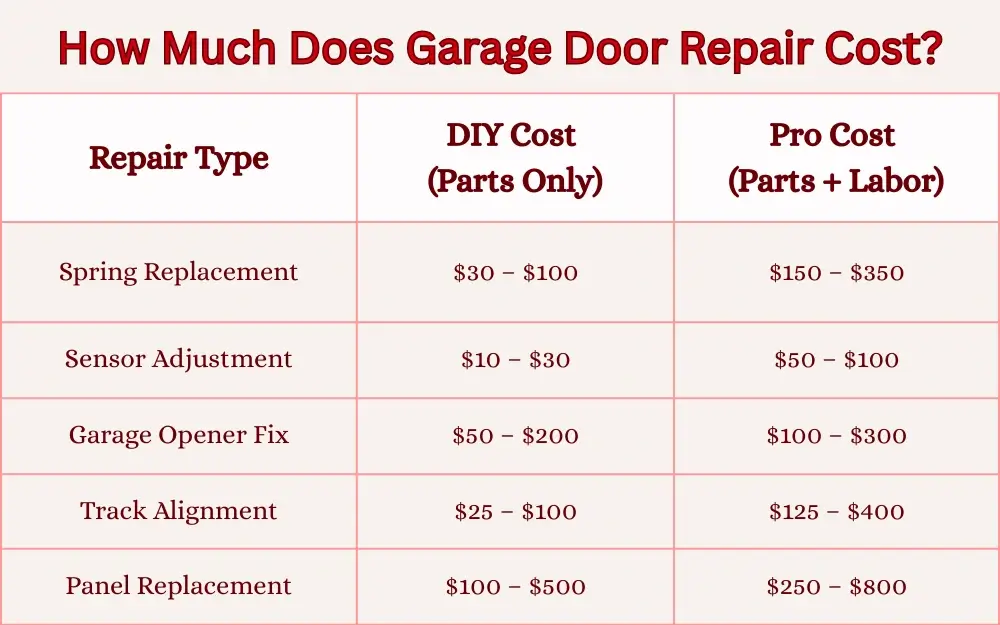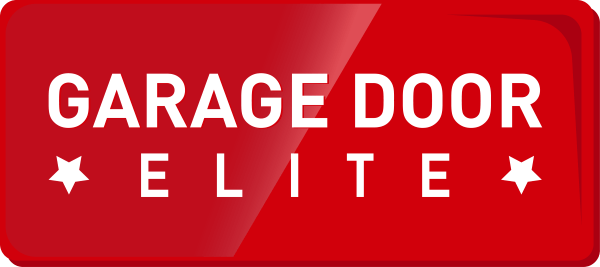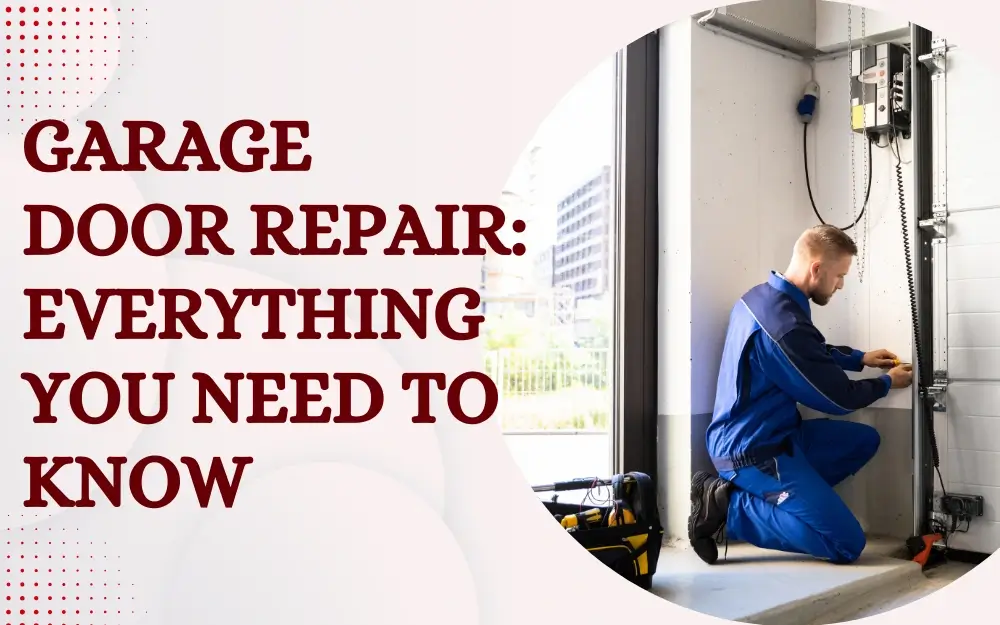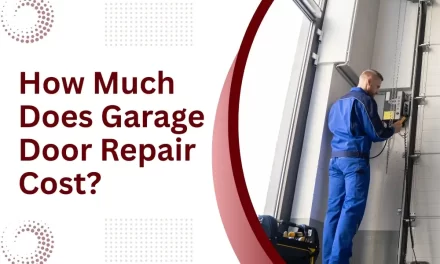Imagine rushing to work, and suddenly, your garage door refuses to open. Or worse, you return home to find it stuck halfway, leaving your home exposed.
These frustrating moments happen more often than you think—garage doors open and close nearly 1,500 times per year (source: International Door Association), leading to broken springs, sensor failures, and track misalignment. While some issues can be fixed with simple DIY solutions, others require professional repair to avoid further damage or injury.
Ignoring garage door problems can compromise your home’s security, increase energy costs, and even cause serious safety hazards. Many homeowners struggle with deciding whether to attempt DIY fixes or hire a professional service. This guide will help you identify common garage door issues, explore cost-saving repair tips, and understand when to call an expert.
How Much Does Garage Door Repair Cost?
Garage door repair costs can vary depending on the type of issue, the extent of the damage, and whether you choose to fix it yourself or hire a professional. On average, garage door repairs range from $100 to $600, but certain repairs, such as spring replacement or opener motor fixes, can cost upwards of $1,000. If you’re considering a DIY repair, keep in mind that not all fixes are safe to do on your own.
For minor issues like sensor misalignment or lubrication, you can handle the repair yourself at a minimal cost. However, if your garage door spring is broken, hiring a professional is the safest option, as high-tension springs can cause serious injuries. Below is a quick cost comparison of DIY vs. professional repair prices:

Note- If your repair costs exceed $800, it may be more cost-effective to replace your garage door entirely, especially if it’s over 10 years old. New garage doors improve home security, energy efficiency, and curb appeal, making them a worthwhile investment.
Now that you have an idea of the costs involved, let’s look at some common garage door problems and how you can tackle them
Common Garage Door Problems And Their Fixes
Many garage door issues can be resolved with simple DIY solutions, while others require professional expertise. Below are common garage door problems and how to fix them yourself before calling a repair service.
1. Garage Door Won’t Open or Close
This is one of the most frustrating garage door problems, and it can be caused by power issues, broken springs, faulty remotes, or misaligned sensors.
Possible Causes:
- Dead remote batteries
- Misaligned safety sensors
- Broken garage door spring
- Disconnected power source
How to Fix It:
- Replace the batteries in your garage door remote.
- Ensure the power source is connected (check the outlet or circuit breaker).
- Align the safety sensors (clean them and make sure both indicator lights are solid).
- Try the manual release cord—if the door moves manually but not automatically, the issue is with the opener.
- If the door is too heavy to lift manually, the spring is broken—DO NOT attempt a DIY fix. Call a professional.
2. Garage Door Makes Strange Noises (Squeaking, Grinding, or Banging Sounds)
A noisy garage door can indicate loose hardware, worn-out rollers, or lack of lubrication. Ignoring these sounds can lead to more severe damage over time.
Possible Causes:
- Loose nuts and bolts
- Unlubricated hinges, tracks, and rollers
- Worn-out metal rollers
How to Fix It:
- Tighten all nuts and bolts using a wrench.
- Apply a high-quality garage door lubricant to hinges, tracks, and rollers (DO NOT use WD-40—it attracts dirt).
- Replace old metal rollers with nylon rollers for quieter operation.
3. Garage Door Remote or Wall Switch Not Working
If your garage door doesn’t respond to the remote or wall button, the issue could be as simple as dead batteries or as complex as a malfunctioning circuit board.
Possible Causes:
- Weak or dead remote batteries
- Opener not plugged in or a tripped circuit breaker
- Remote needs reprogramming
- Faulty wall button or circuit board failure
How to Fix It:
- Replace the remote batteries and test again.
- Check if the opener is properly plugged in and inspect the circuit breaker.
- Reprogram the remote (follow the manufacturer’s instructions).
- Reset the garage door opener by unplugging it for 30 seconds and plugging it back in.
- If the wall button is unresponsive, the circuit board may be faulty—call a professional.
4. Garage Door Opens or Closes Randomly
A garage door that operates on its own is a serious security risk and can be caused by signal interference, wiring issues, or a stuck wall button.
Possible Causes:
- Neighbor’s remote interfering with your frequency
- A malfunctioning circuit board in the opener
- Sticky or faulty wall button
How to Fix It:
- Change your garage door opener frequency to prevent interference.
- Inspect and clean the wall button—dust buildup can cause it to stick.
- Reset the garage door opener settings according to the manual.
- If the issue persists, call a professional to check for electrical problems.
5. Garage Door Moves Unevenly or Gets Stuck
If your garage door moves unevenly or stops halfway, it may be off-balance or facing track obstructions.
Possible Causes:
- Damaged or dirty tracks
- Worn-out rollers
- Broken garage door cable
How to Fix It:
- Inspect the tracks for debris and clean them.
- Lubricate the rollers for smoother operation.
- Check if one side of the garage door is lower than the other—if so, a cable may be broken (call a professional).
6. Garage Door Opens Partially and Stops
If your garage door starts moving but suddenly stops, the issue may be with the springs, sensors, or opener settings.
Possible Causes:
- Weak or broken torsion springs
- Opener force settings too low
- Sensor misalignment
How to Fix It:
- Check if the springs are stretched or broken—if so, call a professional.
- Increase the opener’s force settings following the manufacturer’s instructions.
- Realign the safety sensors and ensure nothing is blocking them.
7. Garage Door Falls Too Fast When Closing (Serious Safety Hazard)
A garage door that slams shut too quickly is extremely dangerous and usually indicates a broken spring or cable.
Possible Causes:
- Broken torsion or extension springs
- Snapped garage door cable
How to Fix It:
DO NOT attempt to fix this issue yourself. Garage door springs are under extreme tension and can cause serious injury. Call a professional immediately.
Garage Door Safety Tips
Garage doors are one of the heaviest moving parts in your home, and if not maintained properly, they can cause serious injuries. According to the U.S. Consumer Product Safety Commission, over 20,000 injuries occur each year due to garage door accidents, including:
- 7,000+ cases of crushed or pinched fingers from doors closing unexpectedly.
- 2,000+ injuries involving children due to defective or unresponsive safety sensors.
- Hundreds of accidents per year from DIY spring repairs gone wrong.
Essential Safety Tips for Garage Door Owners
Test the auto-reverse safety feature monthly– Place an object under the door. If it doesn’t stop and reverse, call for repairs immediately.
Never attempt DIY spring replacements– The high tension in garage door springs can cause serious injury or death if improperly handled.
Keep garage door remotes out of children’s reach– Accidental operation is a common cause of injuries.
Check garage door cables and tracks regularly– If you notice fraying cables or misaligned tracks, schedule a professional inspection.
When to Call a Garage Door Repair Professional?
While some garage door repairs can be handled with simple DIY fixes, certain complex or dangerous issues should never be attempted without professional help. Trying to fix the wrong problem on your own could lead to severe injuries or make the damage worse.
Situations Where You Should Call a Professional:
Broken garage door springs– Torsion and extension springs are under extreme tension and can cause serious injuries if mishandled.
Garage door is off-track– If your door has come off its tracks, forcing it back into place incorrectly can damage the entire system.
Motor or electrical issues– If the opener motor is unresponsive, and troubleshooting hasn’t worked, there may be electrical faults that require a trained technician.
Severe garage door panel damage– Large dents or warping can affect balance, and replacing panels requires proper realignment techniques.
If your garage door is making loud popping or snapping noises, moving erratically, or slamming shut uncontrollably, do not attempt a repair yourself. Call a licensed garage door technician to inspect and resolve the issue safely.
Factors to Consider Before Hiring a Garage Door Repair Service
Not all garage door repair services offer the same level of expertise, pricing, or reliability. Before hiring a company, consider the following factors:
1. Licensing & Insurance
Make sure the repair company is licensed and insured to operate in your area. A licensed technician has the proper training, and insurance protects you from liability in case of accidents.
2. Experience & Reputation
A company with 5+ years of experience is more likely to provide high-quality service. Read customer reviews on Google, Yelp, or the Better Business Bureau (BBB) to see what past clients say about them.
3. Pricing Transparency
Beware of companies that give vague estimates or lowball their pricing only to charge hidden fees later. Ask for a written quote upfront, including labor costs and parts.
4. Warranty on Parts & Labor
A reputable company will offer at least a 90-day warranty on parts and labor. Some companies provide extended warranties for springs, openers, and panels.
5. Response Time & Availability
If your garage door issue is urgent, look for a company that offers same-day or emergency repair services. Some businesses also provide 24/7 services for weekend and nighttime emergencies.
6. Special Offers & Discounts
Many garage door repair companies offer seasonal promotions, military discounts, or first-time customer deals. Always ask if there are any current discounts available.
7. Locally-Owned vs. National Chains
Local garage door repair companies often have lower prices and faster response times, while national chains offer more standardized service but may charge higher fees.
Conclusion
A well-functioning garage door is essential for your home’s security, convenience, and energy efficiency. While some issues can be fixed with simple DIY solutions, others—like broken springs, off-track doors, or electrical malfunctions—require professional repair to avoid further damage or injury.
If your garage door is more than 10–15 years old and requires frequent repairs, it might be more cost-effective to replace it entirely. A new garage door not only enhances security and curb appeal but can also reduce energy costs with better insulation.
Also Read- Best CRM For Small Business
FAQs
How long does a garage door repair take?
Most minor repairs take 1-2 hours, while major fixes may take a full day.
Can I fix my garage door spring myself?
No! Garage door springs are extremely dangerous. Always hire a professional.
How much does it cost to replace a garage door?
The average cost for a full garage door replacement is $1,200 – $4,000, depending on the material and insulation.




Trackbacks/Pingbacks